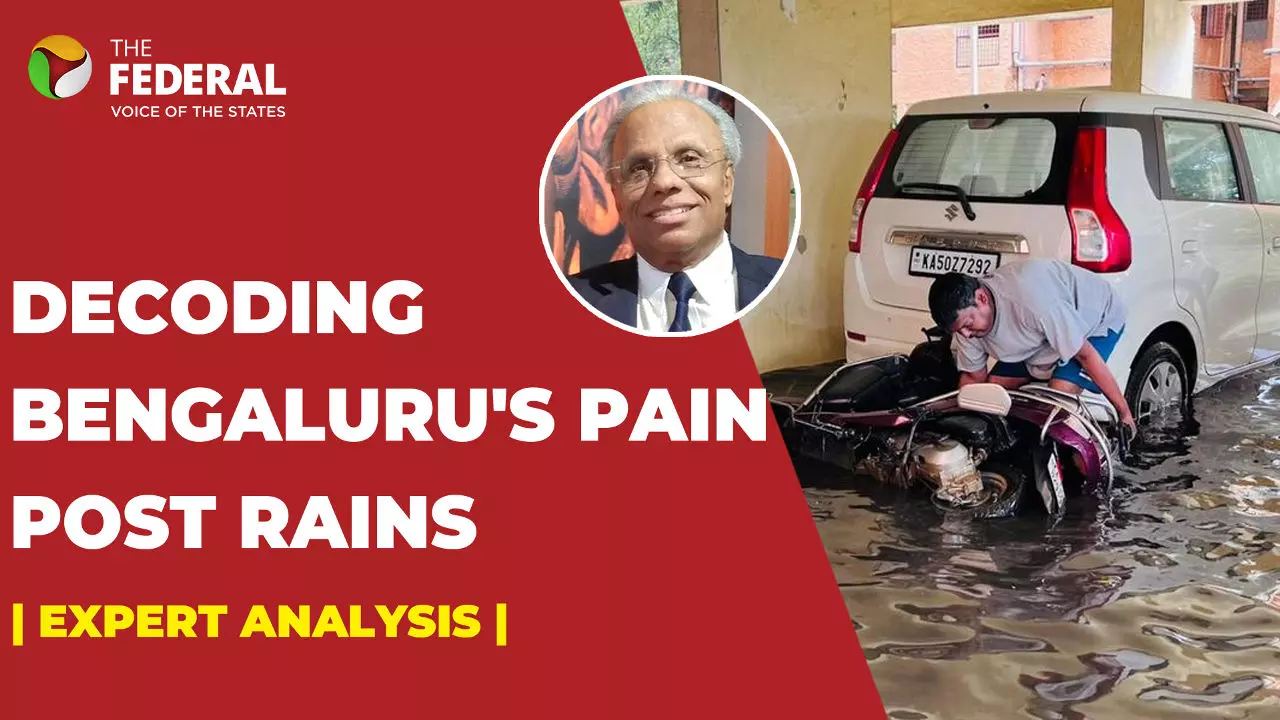
Bengaluru rains: Prof. Shrihari slams BBMP for failing city's flood management
Floods hit the same Bengaluru spots every year. Are poor planning and lack of accountability to blame, or is it time for a governance overhaul?

Year after year, Bengaluru finds itself underwater during the monsoon. Despite being a predictable seasonal phenomenon, the city continues to suffer from avoidable flooding. In a candid interview, urban mobility expert Prof. MN Shrihari calls out the city's failure to act on time, the lack of civic sense among citizens, and the ineffective functioning of corporations like BBMP. He urges both government bodies and residents to rethink how they approach urban governance and civic responsibility.
Nature is not to blame
“Rain is nature. Nobody can control the intensity, duration, or where it will fall,” Prof. Shrihari begins. But he emphasises that while nature is unpredictable, preparedness is very much in human hands. “We have to prepare for the rain, we have to protect ourselves,” he says, likening it to how we shield our homes from both sun and rain.
Also read: Bengaluru man serves Rs 50 lakh notice to BBMP for agony caused by 'bad roads'
Citing the English saying “prevention is better than cure”, he advocates for preventive measures such as cleaning drainage systems and roads before the rains arrive. “If we do preventive work, there’s no need for cure. Curing won’t be necessary if we stop problems from happening in the first place.”
Civic education matters
Prof. Shrihari believes that a key challenge is the lack of awareness among citizens. “Education is not just a degree; it’s about how we maintain our surroundings,” he says. Many people, he notes, dispose of waste irresponsibly, clogging drains.
Also read: Heavy rains batter Maharashtra and Karnataka
He proposes that each corporator form small committees within their wards to educate residents on responsibilities, duties, and environmental behaviour. “Corporation officials haven’t come from heaven,” he quips. “I’m a PhD, but that doesn’t mean I know everything. Everyone must understand their limits and duties.”
Questioning accountability
When asked about the BBMP’s preparedness, Prof. Shrihari doesn’t mince words. “Every city is run by a corporation. Funds are given. But why isn’t work being done? Who is accountable?” He demands the formation of public affairs committees to investigate how money is spent and why services are not delivered.
“There is no accountability at all,” he asserts. He stresses the need for strict oversight in town planning, fund allocation, and execution. “Only then will we have control,” he adds.
When should government step in?
On the issue of developmental spending, Prof. Shrihari says, “There is no use.” If corporations fail, he believes the government must intervene. “Either the government should take over, or action should be taken against the corporation,” he says.
He highlights the importance of recognising good work. “If a small town does well, it should be recognised, and its model replicated in other places,” he advises.
Strong local governance
Citing global examples, he notes, “In the UK and US, cities have strong mayors. If they fail, they’re removed.” But in India, “Once someone becomes mayor, he thinks he’s a king. That should not happen.”
Prof. Shrihari calls for increased public participation, urging people with integrity to enter public life. “People with clean hands should be elected or come into administration. Only then will real development happen.”
Same places flood again
Addressing the issue of repeated flooding in areas like Manetha Tech Park and Silk Board, he says these are known low-lying areas and should be handled proactively. “Proper slope should be given for easy water flow to the main drain system,” he says.
He criticises BBMP’s reactionary measures: “When it rains, then we open our eyes and clean the drains. But this must be done two to three months in advance. Can we prepare for war the day before? No, we prepare in advance.”
Tunnel road debate
On the proposed tunnel road from Lalbagh to the airport, Prof. Shrihari is sceptical. “Is it even necessary? If it’s just one tunnel, how will it help?” He questions the feasibility and justification behind the project, suggesting that such massive infrastructure investments require deeper scrutiny and planning.
(The content above has been generated using a fine-tuned AI model. To ensure accuracy, quality, and editorial integrity, we employ a Human-In-The-Loop (HITL) process. While AI assists in creating the initial draft, our experienced editorial team carefully reviews, edits, and refines the content before publication. At The Federal, we combine the efficiency of AI with the expertise of human editors to deliver reliable and insightful journalism.)

